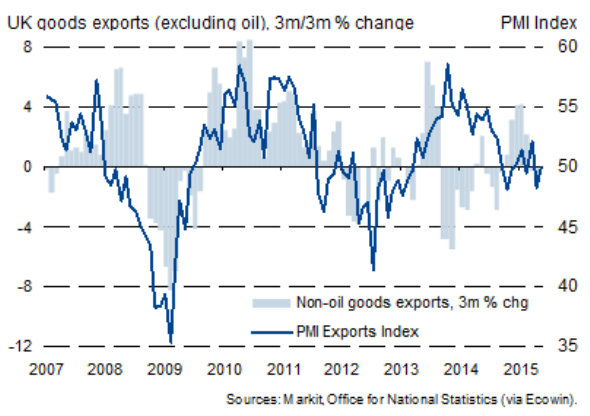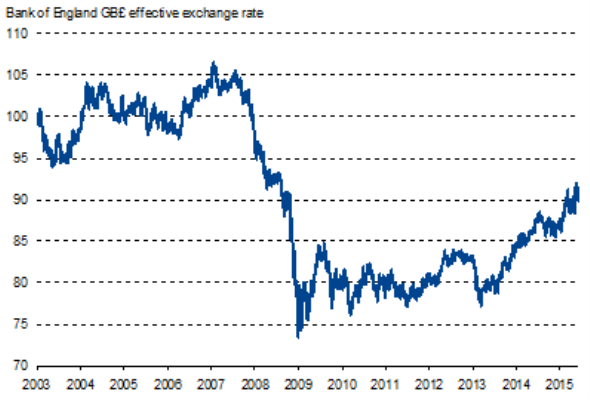Customer Logins
Obtain the data you need to make the most informed decisions by accessing our extensive portfolio of information, analytics, and expertise. Sign in to the product or service center of your choice.
Customer Logins
ECONOMICS COMMENTARY
Jun 09, 2015
UK trade deficit worsens in three months to April as exports fall 2.5%
A narrowing of the UK's trade deficit with the rest of the world in April is welcome news, but needs to be treated with caution, as the underlying trend appears to be one of worsening exports as the strong pound hurts competitiveness.
The trade deficit fell from "3.1bn in March to "1.2bn in April, led by the smallest goods deficit for just over a year. However, the monthly trade data are highly volatile. It is therefore useful to look at what's happening over a three-month period in order to get a better idea of the underlying trend. In the three months to April, the overall deficit rose to "7.2bn compared to "5.6bn in the three months to January - a 29% increase. The goods deficit, which is perhaps the more reliable indicator of the country's competitiveness in the international arena, rose from "29.0bn to "30.0bn over the same period, a 3.5% increase. On this basis, the goods deficit is in fact running at one of the highest levels recorded in recent history (see chart).
UK goods deficit

The worsening trade balance in goods reflected a "1.9bn (or 2.5%) drop in exports over the latest three months compared to just a "0.8bn (0.8%) fall in imports. If oil is excluded, the export picture is not quite so dark, with a more modest 0.9% drop recorded in the latest three months. However, that represents the worst export trend since last August.
UK trade balance

Non-oil exports

The deteriorating underlying trend in the trade data has also been reflected in the business survey data, which point to ongoing disappointment in May. The survey responses also lay at least some of the blame on the appreciation of sterling. Although down in recent sessions, the pound is trading at its highest level since early-2008 on a trade-weighted basis. The latest PMI data showed export orders falling marginally in May, dropping for the third time in the past four months, as companies reported that the stronger exchange rate was hitting competitiveness in overseas markets.
The stronger pound also appears to be hurting orders from domestic customers, who look to prefer cheaper imports.
UK exchange rate

While the narrowing of the deficit in April bodes well on its own for trade to help boost economic growth in the second quarter compared to the lacklustre expansion seen in the first quarter, the weakness of the underlying trend in the deficit and the disappointing survey data suggest it is too early to bake any improvement in the trade position into short-term economic forecasts.
Chris Williamson | Chief Business Economist, IHS Markit
Tel: +44 20 7260 2329
chris.williamson@ihsmarkit.com
{"items" : [
{"name":"share","enabled":true,"desc":"<strong>Share</strong>","mobdesc":"Share","options":[ {"name":"facebook","url":"https://www.facebook.com/sharer.php?u=http%3a%2f%2fwww.spglobal.com%2fmarketintelligence%2fen%2fmi%2fresearch-analysis%2f09062015-economics-uk-trade-deficit-worsens-in-three-months-to-april-as-exports-fall-2-5.html","enabled":true},{"name":"twitter","url":"https://twitter.com/intent/tweet?url=http%3a%2f%2fwww.spglobal.com%2fmarketintelligence%2fen%2fmi%2fresearch-analysis%2f09062015-economics-uk-trade-deficit-worsens-in-three-months-to-april-as-exports-fall-2-5.html&text=UK+trade+deficit+worsens+in+three+months+to+April+as+exports+fall+2.5%25","enabled":true},{"name":"linkedin","url":"https://www.linkedin.com/sharing/share-offsite/?url=http%3a%2f%2fwww.spglobal.com%2fmarketintelligence%2fen%2fmi%2fresearch-analysis%2f09062015-economics-uk-trade-deficit-worsens-in-three-months-to-april-as-exports-fall-2-5.html","enabled":true},{"name":"email","url":"?subject=UK trade deficit worsens in three months to April as exports fall 2.5%&body=http%3a%2f%2fwww.spglobal.com%2fmarketintelligence%2fen%2fmi%2fresearch-analysis%2f09062015-economics-uk-trade-deficit-worsens-in-three-months-to-april-as-exports-fall-2-5.html","enabled":true},{"name":"whatsapp","url":"https://api.whatsapp.com/send?text=UK+trade+deficit+worsens+in+three+months+to+April+as+exports+fall+2.5%25 http%3a%2f%2fwww.spglobal.com%2fmarketintelligence%2fen%2fmi%2fresearch-analysis%2f09062015-economics-uk-trade-deficit-worsens-in-three-months-to-april-as-exports-fall-2-5.html","enabled":true}]}, {"name":"rtt","enabled":true,"mobdesc":"Top"}
]}



